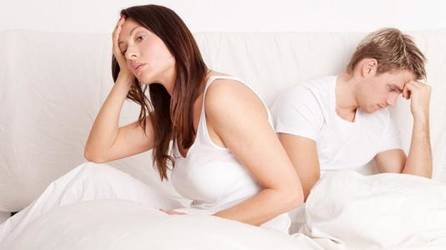Pain during sex

by Martina Feichter
Pain during sex (medical term: dyspareunia) is a serious problem, especially for women. Dyspareunia can turn sex into agony and have a very negative impact on relationships. Men also sometimes experience intercourse as painful. The possible reasons for pain during sex are manifold. The following paragraph tries to shed some light on possible remedies.
Pain during sex – a description
Pain that occurs directly before, during or after penetration is called dyspareunia. They have organical and/or psychological causes.
Especially women frequently suffer from pain during sex. About ten percent of them feel pain during penetration. An even bigger percentage finds sex uncomfortable in general. Men on the contrary, experience way less pain during sex.
Pain during sex: Reasons and possible conditions in women
Most frequent conditions for pain during sex in women are:
- Inflammation of the genital area: Inflammation of the vagina (vaginitis) and/or the labia (vulvitis) are often the cause for pain during sex. Sometimes these conditions make sex even impossible. A chronical inflammation of the fallopian tube and the ovaries (chronical salpingitis) can also be the cause for pain during sex.
- Vaginal yeast infection: A vaginal inflammation caused by Candida can result in itching, burning, and pain during sex. If the urethra is also affected it can cause problems with urination.
- Tight entrance to the vagina: Girls and young women with a tight entrance to their vagina can experience pain during sex.
- Insufficient vaginal lubrication (lubrication disorder): If the pain only occurs during or shortly after sex, insufficient vaginal lubrication, and the resulting reduced smoothness can be the cause. Reasons for this reduced smoothness can be a lack of estrogen after menopause, a lack of arousal, a charged relationship or psychological problems.
- Ovary cysts: fluid-filled blisters at the ovaries occur frequently shortly after puberty and before menopause. Small cysts usually don’t pose a threat, whereas bigger ones can cause menstrual pain, dull lower abdominal pain, back pain as well as pain during intercourse and defecation.
- Uterine fibroid: Myomas are growths in the muscular layer of the uterus and represent the most frequent form of benign tumors in the female genital tract. Depending on their location, they can cause menstrual disorders, intensified urgency, constipation, abdominal- and back pain as well as pain during sex. Many uterus myomas, however, don’t cause any problems at all.
- Other forms of tumors: Apart from cysts and myomas, there are also other kinds of tumors that can cause pain in the genital tracts. For example growth of tissue in the back part of the uterine cervix or in the recto-uterine pouch.
- Endometriosis: This disease causes, for up to today unknown reasons, benign and mostly painful growths of the uterine lining in adjacent organs (lower abdominal- or pelvic area). Possible consequences are infertility, menstrual disorders, lower abdominal pain, and pain during sex.
- Chronical non-bacterial blatter infection (interstitial cystitis): A chronical inflammation of the bladder that was not caused by bacteria can cause a pressing pain during sex and sometimes even trigger the urge to urinate during intercourse.
- Adhesions and scars: Damaged tissue, adhesions or scars after giving birth, surgeries or venereal diseases can also be the cause for pain during sex.
- Fixed uterine retroversion: Usually, the uterus bends slightly forward, towards the bladder. In some women, it is, however, bend back towards the sacrum. This condition can exist innately or it can be caused by giving birth. If this retroversion remains fixed, due to adhesions to the rectum as a result of inflammation of endometriosis, the uterus cannot straighten up. This can lead to backache, painful menstruation, constipation and pain during sex.
- Uterine prolapse: A uterine prolapse can also be the cause of pain during sex. Due to weak holding muscles of the uterus and the pelvic floor, the uterus slowly sinks. Often the vagina, the bladder, and the rectum also sink down. In the worst case, this results in a complete uterine prolapse, where the vagina is turned inside out.
- Lichen sclerosus (LS): A chronic inflammatory skin disease of unknown origin that mainly affects women. It can occur at any age in the area of the labia. Typical symptoms are a parchment-like, thin and whitish skin. Due to a reduction of tissue elasticity the skin experiences shrinking effects that can cause pain during sex. Further symptoms include burning sensation and itching in the labial area, soreness, pain during urination as well as constipation.
- Psychological causes: Pain during sex can also be the result of negative sexual experiences (sexual abuse). It is also possible, that an initially organical cause of pain (adhesions, cysts etc.) has triggered fear of painful sex. This mental link between “sex+pain” can become independent over time and persist even after the organical cause of the pain has been removed and so the following pain during sex is based on a psychological condition.
Pain during sex: Reasons and possible conditions in men
If men experience pain during sex, the following reasons might be the cause:
- Phimosis: Painful sex can be caused by an innate or acquired phimosis. As a result, pulling back the foreskin is not possible or only under pain. Is the contracted foreskin pulled back with force, it can get trapped behind the glans penis – this so-called paraphimosis is an emergency that needs medical attention at once, as the glans can die off due to the restricted blood flow.
- Pathological penile curvature (Induratio penis plastica, IPP): IPP is a local fibrous hardening of the erectile tissue that often results in a painful curvature of the erect penis. As a consequence, those who have IPP suffer from painful erections and pain during sex. Intercourse is impeded mechanically. IPP can be innate or acquired.
- Chronical Prostatitis: A chronical inflammation of the prostate gland can cause a variety of conditions, such as severe pain during sex (more precisely: during ejaculation), pain that is located “deep within the pelvis”, pain in the perineum, in the penis, in the testicles, in the groin and pubis, and problems with urination.
- Urethritis: Another cause of pain during sex can be urethritis. The urethritis itself is often triggered by an infection, such as gonorrhea, chlamydia or other sexually transmitted diseases.
- Penile fracture: A cracking noise and severe pain during intense sexual intercourse can indicate a penile fracture. This means that the hull of the strong connective tissue that spans around the corpus cavernosum which is well supplied with blood has ruptured. The erection immediately recedes and the penis swells and changes its color. A penile fracture is an emergency and requires immediate medical attention.
- Lichen sclerosus (LS): Although this disease occurs predominantly in women (see above), it can also occur in men and cause pain during sex.
- Priapism: A priapism is a constant, very painful erection that lasts for at least two hours. The cause for this constant erection is not always clear. In some cases, it is caused by leukemia, tumors, blood clots (thrombosis) in the pelvic area, or by certain erectile dysfunction treatment medications. Due to impending tissue damage, it is recommended to immediately get medical attention.
Pain during sex: vaginismus
Women who suffer from vaginismus have involuntary and sometimes painful muscular contractions in the lower area of the vagina, including the perineal muscles, when a finger, a tampon or a penis is inserted. These women cramp and squeeze their legs together in a protective stance. Neither intercourse nor a gynecological examination is possible with vaginismus.
Causes of vaginismus
In most cases, vaginismus is the result of a psychological defensive reaction, triggered by fear (of pregnancy of pain), psychosexual inhibition or an earlier trauma (such as rape). In rare cases, vaginismus can be the result of persisting pain during sex (dyspareunia).
Treatment of vaginismus
Consultations together with the patient’s partner, behavioral interventions and training (such as inserting increasingly bigger dilators with lubricants) can be helpful in treating vaginismus.
Pain during sex – When to seek medical attention
All forms of pain during intercourse should be medically examined, no matter if they are acute or have been persisting for quite some time.
Pain during sex – What will the doctor do?
The doctor will start with your medical history. Important pieces of information can be:
- When does the pain occur during sex? Upon touching the labia, upon entering the vagina, during normal sexual movements or only during deep penetration?
- Where exactly is the pain located? Around the labia, in the vagina, in the penis, or in the lower abdomen?
- How would you describe the pain? Is it a burning, stinging or rather pulling sensation?
- Has this pain always been there, even since your first intercourse? Do you feel this kind of pain every time you have sex, or only in certain situations?
After the anamnesis women are usually gynecologically examined and men have a urological examination in order to identify possible organical causes for the pain during sex. Possibly, further examination is required.
Should the practitioner suspect an infection or inflammation in the genital tract (inflammation of the prostate, urethra or bladder) to be the cause for the pain, a urine sample is analyzed. With vaginal infections, a gynecological smear is taken and analyzed in the laboratory. Myomas and cysts as possibles causes for pain can often be detected during an ultrasound examination. Should the doctor suspect endometriosis to be the cause for the pain, ultrasound examinations and abdominal endoscopy are the methods of choice.
Possible treatments for pain during sex
If an organical reason is the cause for pain during sex, the doctor will tend to it. Should the patient’s vagina not get as wet as needed, due to a lack of estrogen (after menopause or after removal of the ovaries), causing pain during penetration, an estrogen creme can be prescribed. Painful infections and inflammations in the genital area can be fought with medication. Even myomas and cysts can be treated with medication, although, in some cases, surgery might be necessary. Penile fractures and severe cases of uterine prolapse definitely require surgery, whereas light cases of uterine prolapse can often be treated with pelvic re-education or the insertion of a pessary.
Is the pain during sex also rooted in psychological issues, a psychotherapeutic treatment can advisable.
Pain during sex – What you can do yourself
- Organically caused pain during sex may occur only in certain positions, as might be the case with endometriosis, uterine prolapse, and larger myomas. Changing your position during sex can prevent the issue or at least alleviate the pain. Therefore, it is often advisable for the woman to be the active part (woman on top).
- A yeast infection can be cured with a sitz bath in chamomile. Furthermore, it is advisable to trim your pubic hair and blow dry it after going to the toilet (yeast likes it wet) and wear breathable underwear.
- Lubricants can be useful if the vagina is not moist enough and therefore causes pain during sex.
- Pain caused by endometriosis can be alleviated through relaxation techniques such as Tai Ji Quan, Qi Gong, Shiatsu and Yoga as these techniques loosen cramps and alleviated the resulting pain during sex.
© Copyright 2013 NetDoktor.de – All rights reserved – NetDoktor.de is a trademark
